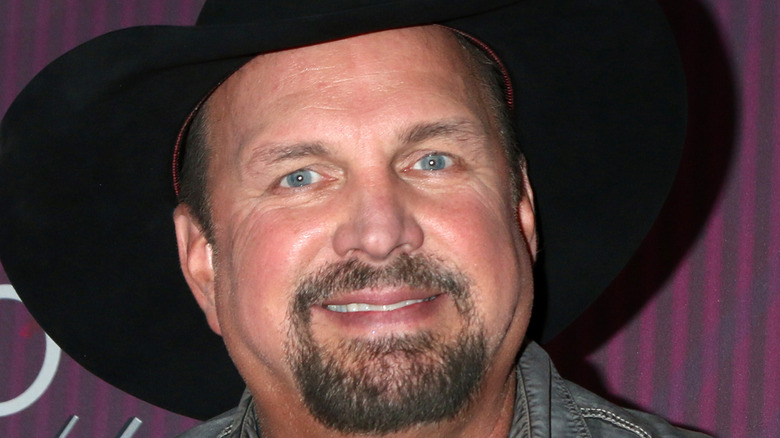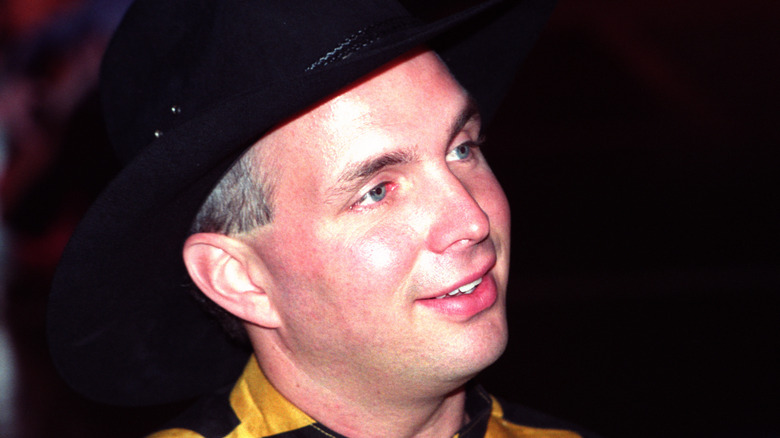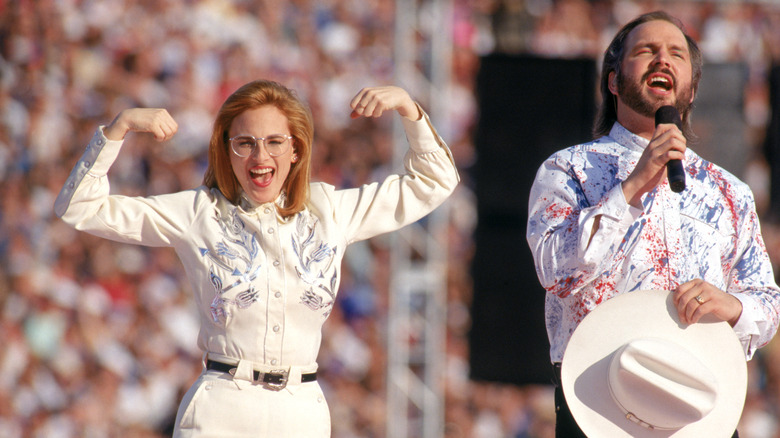Garth Brooks Almost Left The 1993 Super Bowl An Hour Before His Performance. Here's Why
If there's one thing no dedicated sports fan wants to hear, it's that their beloved football/baseball/soccer/basketball/hockey/etc. is "just a game." It's a little like being told to calm down when you're absolutely ear-steaming furious — left despondent after a high-stakes loss, no supporter has ever felt better after hearing this.
The fact of the matter is, sports enthusiasm is a community. A lifelong passion. Viewing figures for the latest Big Game can be astronomical. According to Mandy News, approximately 2 billion people watched the final of the 2022 Qatar World Cup, in which Lionel Messi's Argentina narrowly triumphed over France in an electrifying soccer match (which ended in a penalty shoot-out).
For many, though, nothing touches the magic of the Super Bowl. It's about so much more than just the game itself. The build-up, the predictions, the excitement, the unrivaled amount of food consumed during Super Bowl parties ... there's nothing quite like it. The match, of course, is a star-studded event, from the players themselves to the VIPs in their special seats in the stands. Then there are those iconic talents asked to perform at the event. These appearances are legendary in themselves. Few who watched 1993's Super Bowl will ever forget Garth Brooks' appearance that year, which almost never happened.
Garth Brooks vs. the Super Bowl
Being called upon to perform the national anthem at the Super Bowl is, undoubtedly, a unique honor. As TODAY reported, the incomparable Whitney Houston performed the beloved song at the 1991 Super Bowl. One of the most glorious takes on the song in living memory, this was The Voice at the peak of her powers, and she absolutely delivered.
Houston's musical director, Rickey Minor, told the outlet in February 2021, "She was vocally at her best for sure, because we were working all the time. So that muscle was being used, but she had it innate." Decades later, the performance is still absolutely spellbinding to listen to, a highlight of Houston's remarkable legacy. Two years later, Garth Brooks lent his own dulcet tones to "The Star-Spangled Banner," another momentous performance. This one, however, became memorable for a very different reason: Brooks, after a dispute with organizers, went to leave the stadium and had to be convinced to return and perform in short order.
The year before, Brooks released the song "We Shall Be Free" about inequality and unfairness. Per Whiskey Riff, the song was written by Stephanie Davis, and it was one of Brooks' favorites. As he himself put it in the materials for his album "The Hits" (via Whiskey Riff), he considers it "easily the most controversial song I have ever done. A song of love, a song of tolerance ... I never thought there would be any problems with this song."
A controversial song
The producers of the Super Bowl, it seems, had some issues with the song, and this was what caused Garth Brooks to almost leave the Super Bowl shortly before one of the biggest performances of his life.
As Taste of Country reports, Don Weiss and Chuck Day shared the remarkable story in their book "The Making of the Super Bowl: The Inside Story of the World's Greatest Sporting Event." Brooks, it seems, had stipulated that he wanted his music video for "We Shall Be Free" to be displayed for the watching world to see before he sang. This, apparently, seemed like too much to ask, with broadcasters unsure of the kind of publicity that might result. Hence the stand-off between Brooks and the organizers of the event, as time ran frighteningly short before the match began.
"With the pregame show rolling toward its conclusion, time was critical," Weiss and Day's book recounts, noting that it was just 45 minutes to kickoff (via Google Books). "Player introductions and other official ceremonies were to follow immediately." Brooks, they report, hadn't pre-recorded anything, meaning that there would be nothing to play at all if he didn't perform.
Taste of Country reports that the organizers relented and the video was played to the world. Brooks then sang the national anthem after all, and the whole affair seems to have resulted in a historic changing of the rules in that regard. According to MTV, "American Idol" music director Ricky Minor told The Associated Press in 2009 that pre-recorded audio is required by the organizers of the event prior to the match.


